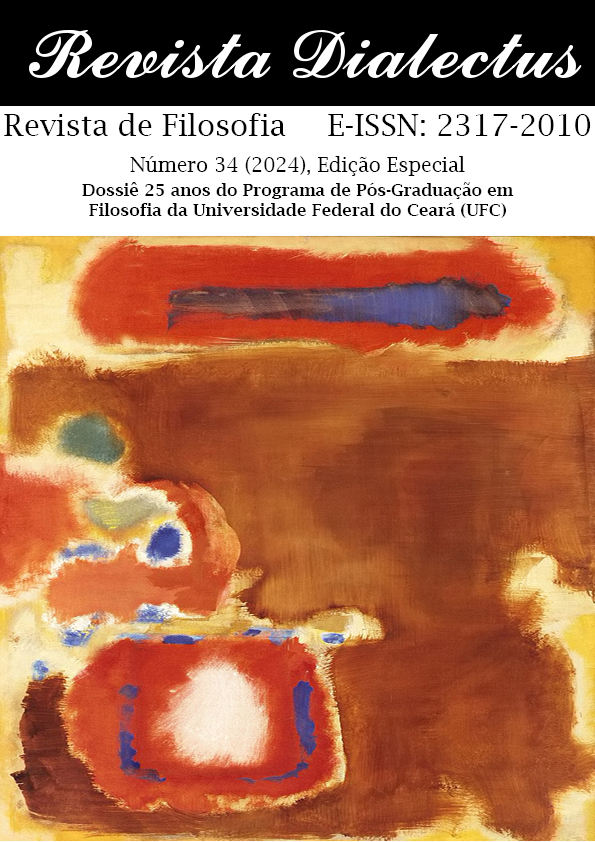O MÉTODO DA FUNDAMENTAÇÃO DA ÉTICA EM KANT
DOI:
https://doi.org/10.30611/2024n34id94618Keywords:
Kant, ética, fundamentação da moral, vontade, autonomiaAbstract
Kant não apresentou o método de sua fundamentação da ética de forma explícita, num tratado próprio. Contudo, podemos compreendê-la como o evidenciar da originalidade da moral. Pois a moral não pode ser derivada de algo não-moral – tão dependência a destruiria. Com isso, a moral não pode ser provada ou justificada num sentido mais estrito, mas apenas pode ser “fundamentada”. E isso pode ser feito quando evidenciamos o lugar ou o topos e a virada ou a trope de seu originar. O topos da origem da moral é, em Kant, a razão prática, sua trope é a virada desta sobre se mesma enquanto autonomia. O que segue desta fundamentação é, por primeiro, a autenticidade da moral e, com isso, sua força obrigatória incondicional, no sentido que esta não é condicionada por algo extramoral; por segundo, segue disso um critério normativo do conteúdo da moral, que é, em Kant, o Imperativo Categórico. O artigo pretende defender que o método kantiano da fundamentação da ética normativa é sem alternativa; contudo, justamente em virtude da descrição meramente formal deste método, abre se a possibilidade de realizá-lo de maneira diferente que o próprio Kant fez, com relação ao conteúdo.
References
HENRICH, Dieter: Kant’s Notion of a Deduction and the Methodological Background of the First Critique, em: FÖRSTER, Eckhard, org., Kant’s Transcendental Deductions, Stanford, CA, 1989, 26-46.
KANT, Immanuel: Gesammelte Werke [Obras completas], citadas da Akademieausgabe (AA [vol.], [p.]), org. pela Königlich Preußischen Akademie der Wissenschaften, Berlin, 1900ss.
LABERGE, Pierre : La définition de la volonté comme faculté d’agir selon la représentation des lois, em: HÖFFE, Otfried, org., Kants Grundlegung zur Metaphysik der Sitten. Ein kooperativer Kommentar, Frankfurt a.M. 42010, 83-96.
MOORE, George Edward: Principia Etica, Oxford 1903.
SEEBERG, Ulrich: Ursprung, Umfang und Grenzen der Erkenntnis. Eine Untersuchung zu Kants transzendentaler Deduktion der Kategorien, Hamburg, 2006.
UTZ, Konrad: Praktische Vernunft in der “Grundlegung zur Metaphysik der Sitten”, em: Zeitschrift für philosophische Forschung, 2015; 69/4: 474-501.
Idem: Quid mihi? Zur Methode der Grundlegung der Ethik bei Kant, em: Deutsche Zeitschrift für Philosophie, 2016; 64(2): 213–227.
WILLASCHEK, Marcus: Practical Reason, em: org. HORN, Christoph e SCHÖNECKER, Dieter, A Commentary on Kant's Groundwork of the Metaphysics of Morals, Berlin 2006, 122s.
WOOD, Allen W.: Kantian Ethics, New York 2008.
Downloads
Published
Issue
Section
License
Copyright (c) 2024 Konrad Utz

This work is licensed under a Creative Commons Attribution-NonCommercial-NoDerivatives 4.0 International License.
Authors who publish in this journal agree to the following terms:
- Authors retain the copyright and grant the journal the right of first publication, with the work simultaneously licensed under the Attribution-NonCommercial-NoDerivatives 4.0 International (CC BY-NC-ND 4.0) License, which allows the non-commercial sharing of work, without modifications and with acknowledgment of authorship and initial publication in this journal.
- Authors are authorized to take additional contracts separately, for non-exclusive distribution of the version of the work published in this journal (eg publish in institutional repository or as a book chapter), with acknowledgment of authorship and initial publication in this journal.
- Authors are allowed and encouraged to publish and distribute their work online (eg in institutional repositories or on their personal page) at any point before or during the editorial process, as this can generate productive changes as well as increase the impact and citation of published work (See The Free Access Effect).



















